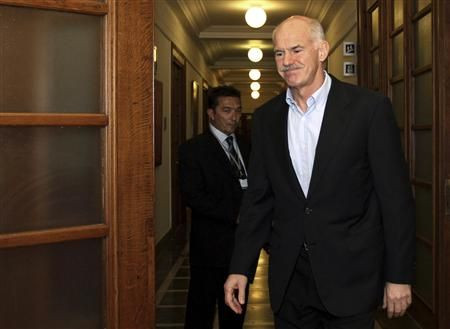Greece Heads for Standstill Before Austerity Vote

Prime Minister George Papandreou appealed for unity on Monday as Greece braced for a 48-hour general strike timed to coincide with a vote on a deeply unpopular package of austerity measures demanded by international lenders.
This is maybe the most crucial week for Greece and Europe, Papandreou said during a meeting with the head of state, President Karolos Papoulias.
It is very important on our part, that the entire Greek political class shows a sense of unity and responsibility.
His comments came as Greece's two main unions, representing about half the four million-strong workforce, prepare for one of the biggest protests since the crisis began two years ago, likely to hit food and fuel supplies, disrupt transport and leave hospitals run by skeleton staff.
The 48 hour general strike is scheduled for Wednesday and Thursday to coincide with the vote in parliament, expected to take place in two stages on both days.
Memories are still fresh of the battles between riot police and stone-throwing protesters at anti-austerity demonstrations in June and sporadic signs of trouble were reported on Monday with a petrol bomb hurled at a garbage truck in a northern suburb of Athens.
Papandreou, trailing badly in opinion polls, has defied a wave of protests, pledging to push through a deeply unpopular package that includes tax rises, pay and pension cuts, job layoffs and changes to collective pay deals.
His four-seat majority is expected to hold up with the support of smaller opposition parties, but at least two members of the ruling PASOK party may oppose part of the bill.
With European Union leaders racing to prepare a new bailout deal in time for a summit on October 23 and growing speculation that Greece may be forced to default on its massive public debt, Papandreou said Greece had to show its resolve.
We must show we want the great changes, to go into this negotiation on October 23 with our head high, with a strong negotiating hand, to make sure we obtain the best for Greece, he said.
Trapped in deep recession and choked by a debt equivalent to some 162 percent of gross domestic product, Greece has been shut out of bond markets and would run out of money within weeks without international support.
Inspectors from the EU and the International Monetary Fund were in Athens last week and have recommended releasing an 8 billion euro aid tranche to enable the government to keep paying its bills past November.
That will only provide temporary relief and they have told Papandreou's struggling Socialist government to push ahead with further belt-tightening, on top of what are already the deepest cuts in Greece's postwar history.
I WANT THEM OUT
How far this will be possible remains unclear in the face of growing bitterness from Greeks who have increasingly turned against their political leadership.
I want them out. They can't solve our problems because they are the ones who got us here, said Maria Papadopoulou, a 57-year old pensioner who helps to support both an unemployed daughter and a son at university.
I don't usually take to the streets but this week we have to rise up and send a message to the government, she said, as mournful protest songs from the era of the 1970s military junta blasted out of loudspeakers set up by strikers occupying the nearby finance ministry.
These measures are targeting the wrong people, the poor. I hope they won't be passed, she said.
With the official unemployment rate running at about 16 percent and many people already suffering wage cuts of more than 50 percent over the past two years, there has been growing doubt that repeated doses of austerity can solve the crisis.
The strike on Wednesday and Thursday will hit public sector institutions including tax offices, state schools and airports as well as banks and businesses ranging from taxis and clothes shops to suppliers of everyday staples like bakers.
As well as the finance ministry, the justice ministry has also been occupied and even judges will hold indefinite stoppages, only issuing rulings on major cases.
Customs officials who clear fuel refinery deliveries hold a 24-hour strike on Monday and will decide whether to extend their action, potentially hitting petrol supplies.
Garbage piled up on Athens streets for a week due to labor action and municipalities hired private firms to collect it before a disease bomb explodes, the health minister said.
A 48-hour strike by seamen, starting on Monday, has brought passenger ferries to a halt, disrupting traffic to the country's dozens of islands.
Leave the seamen and their pensions alone, there's too few of us left anyway, George Nikolaidis of the seamen's union told a private radio station.
Public transport services in Athens are expected to be operating at least some services, allowing demonstrators to reach the main site of the protest in Syntagma Square, outside parliament.
Revised data on Monday showing Greece's 2010 budget deficit reached 10.6 percent of GDP, above the 10.5 percent previously reported, underlined the scale of the problem.
© Copyright Thomson Reuters 2024. All rights reserved.




















